Every day, Garrison Keillor sends out a new edition of “The Writer’s Almanac.” He always begins each day’s post with a poem. Today’s poem was by Charles Simic and titled “Nineteen Thirty-eight.” Thinking about his poem written about the year of his birth, I recalled a piece I wrote a few years ago on the year I was born. I wrote this in prose, but wondered if it might be crafted into a poem? Probably not this week… This piece originally appeared in my former blog.
1957
Jeff Garrison

I arrived at the Moore County Hospital, just outside of Pinehurst, on a Wednesday morning in mid-January 1957. The highways we drove home on through the Sandhills were all paved by then, but many of the county roads including the one we lived on were still dirt. It was a simpler time. Longleaf pines surrounded the highways and golf courses and small farms raising bright-leaf tobacco dotted the landscape. The Lower Little River was populated by my relatives. We were mostly descendants from Highlanders from Scotland and for us, tobacco was king (and still considered safe). It sold for 59 cents a pound. Nearly a half million acres were raised in North Carolina, producing over 1700 pounds an acre. You can do the math.
In the same month I arrived, a meeting of African-American pastors led to the Southern Christian Leadership Conference. We’d hear more about them in the next decade as integration was moving into the forefront. Before the year was out, there’d be the incident in Little Rock and the Senate under the leadership of Lyndon Johnson passed the first civil rights legislation since the Reconstruction. We’d also be hearing more about civil rights and Johnston in the years ahead.
Two days after my arrival, three B-52s made the first non-stop around-the-world flights and General Curtis LeMay bragged that we could drop a hydrogen bomb anywhere in the world. The one place we did drop one that year, accidentally, was New Mexico. Thankfully, it didn’t detonate which is why no one knew about it. The military were exploding bombs in Nevada but said everything was safe and no one knew differently except for the sheepherders whose flocks began to lose their wool and die off. There were other nuclear accidents in ’57 in the US and UK, but we didn’t know about them. We just trusted that our governments would never do anything to harm us.
Although there were no major wars going on, the world was tense. In October, the first American soldier was killed in Vietnam, a country we’d learn more about. But in ’57, the focus was mostly on the Suez Crisis and the threat of a Soviet nuclear attack. The DEW line was completed in the Arctic. When proposed, it was to provide a six hours warning before the first Soviet bomb could be dropped on an American city. By the time the work was completed, the margin was cut to three hours as Soviet jets had doubled their speed. A few months later it became extraneous as the Soviets launched their first intercontinental ballistic missile. Later, they launch Sputnik and we’d spend the next twelve years in a space race. Amidst all this, some yo-yo created the first plastic pink flamingo. The end was near as prophesied by Nevil Shute, On the Beach, a post-nuclear war novel published in 1957. I’d read it in high school.
To save us from calamity, we placed our faith in Ike, the President, who many thought I resembled as I too had a bald head.Thankfully Ike wasn’t Herod and didn’t waste any time worrying about a newborn impostor as he perfected his golf swing and began his second term as the leader of the free world.
Jack Kerouac published On the Road in 1957, and people were heading out on the road as a new line of fancy cars with high fins and excessive chrome were revealed. The ’57 Chevy became an icon of the era as Ike announced the building of interstates to connect the cities of our nation. Cars ruled! New York City abandoned its trolley cars in 1957, and shortly afterwards the Brooklyn Dodgers (originally the Trolley Dodgers) announced they were moving to Los Angeles. In other sporting news, the University of North Carolina beat Kansas in the NCAA basketball finals. These teams have remained near the top throughout my life. The Milwaukee Braves led by a young Hank Aaron beat the New York Yankees in the World Series. We’d hear more from Aaron and the Yankees, but Milwaukee faded when the Braves high-tailed it to Atlanta. The Detroit Lions, a team whose demise parallels its city, won their last NFL championship.
Ayn Rand published Atlas Shrugged in 1957. Nearly six decades later, “Who is John Galt?” bumper stickers are occasionally spotted on American highways. In the theaters, The Ten Commandments was the top box office success. For a country that seems so religious yet so consumeristic, the commandment about not coveting appears overlooked and Rand “look out for me” philosophy glorified the sin. Other commandments were also being broken as “Peyton Place,” which debuted in theaters, reminded us.
Radios in 1957 were playing the music of Elvis, Buddy Holly, Debbie Reynolds, the Everly Brothers, and Sam Cooke. In Philadelphia, teenagers danced for the first time on American Bandstand as more and more homes acquired televisions. In England, two chaps named Lennon and McCarthy met and would go on change music as we know it. Humphrey Bogart died just two days before my arrival, but it was still a good year for Hollywood. Not only was Moses selling, but so were dogs as children everywhere cried watching Old Yeller. Another movie released was the Bridge over the River Kwai which motivated whistlers everywhere. That old British army tune would later be used in a commercial for a household cleanser and inspired one of the beloved parodies of my childhood:
Comet – it makes your teeth turn green.
Comet – it tastes like gasoline.
Comet – it makes you vomit.
So buy some Comet, and vomit, today!
###




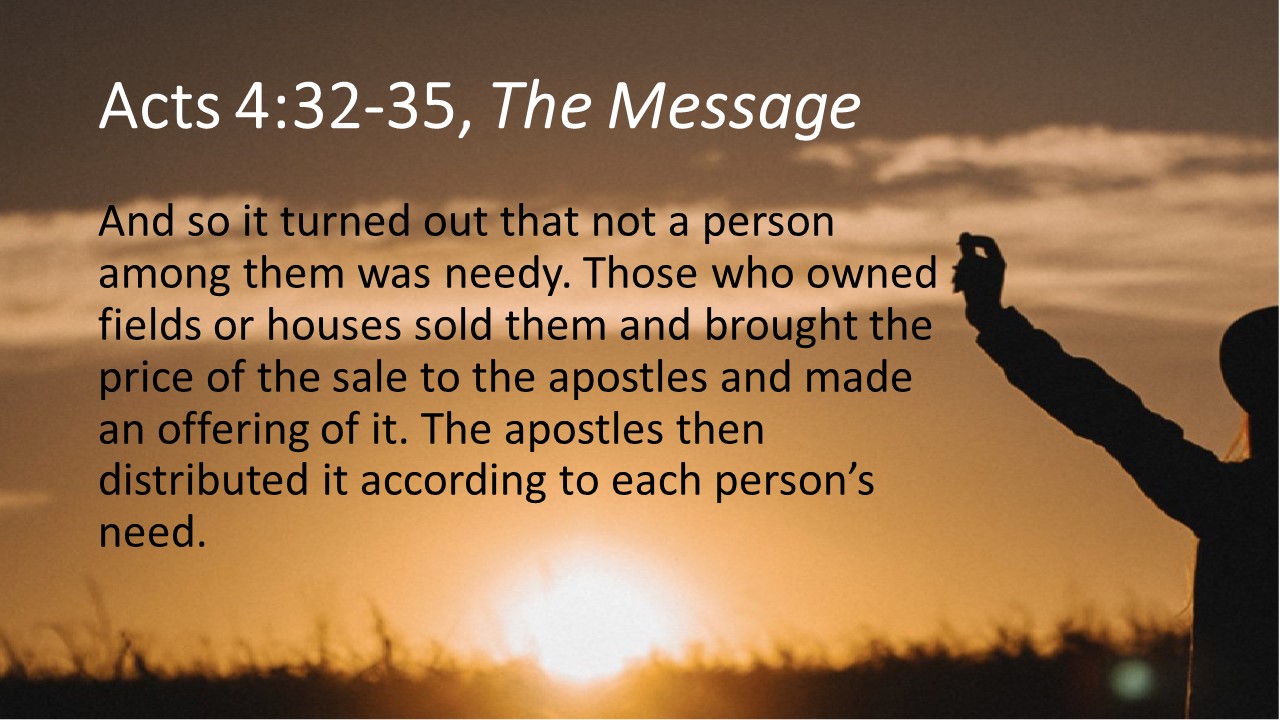
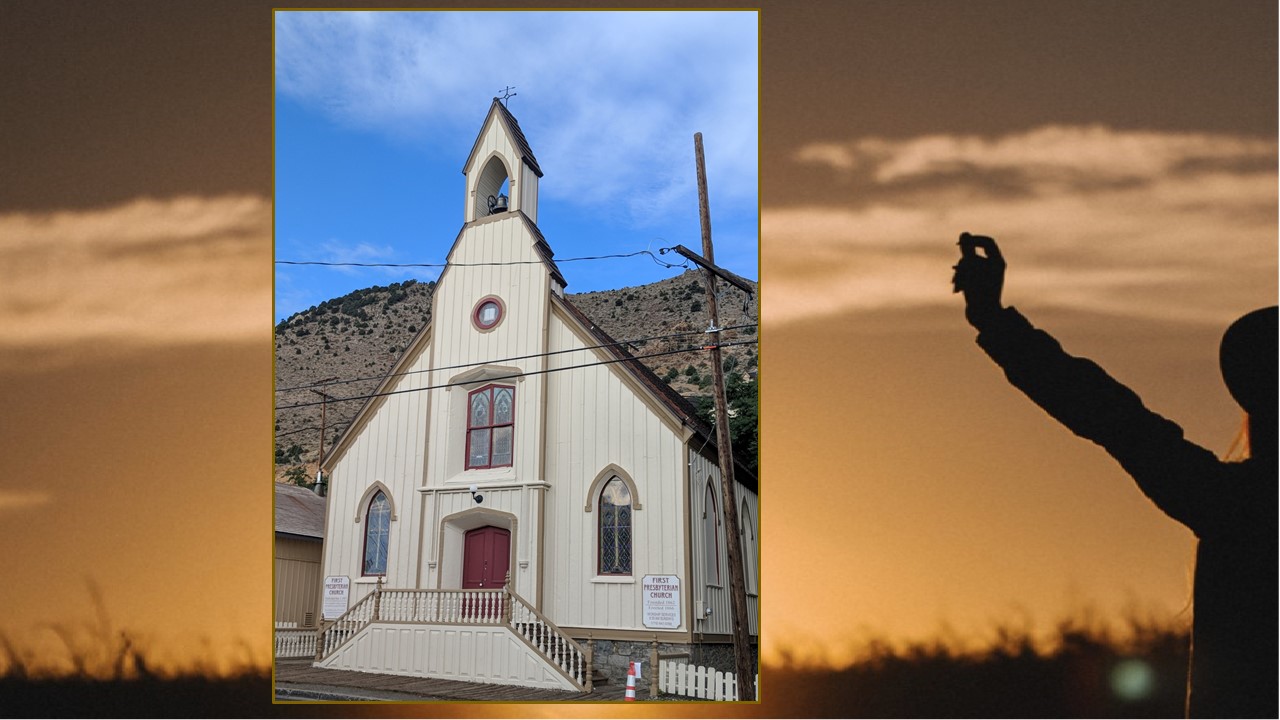 I will always be indebted to the congregation in Virginia City, Nevada, a place where I first experienced ministry on my own as a student pastor for a year. The church on the Comstock, at least in the modern era, has always been small. But there was something about the fellowship of that group that made it an attractive place for all kinds of people. The people in the church worked hard together, keeping the church going, which was quite a task in a wooden building built in 1866. But they also worked hard to help one another. And they tried to help others, sending clothes to an orphanage in Mexico and collecting food for a pantry in Carson City.
I will always be indebted to the congregation in Virginia City, Nevada, a place where I first experienced ministry on my own as a student pastor for a year. The church on the Comstock, at least in the modern era, has always been small. But there was something about the fellowship of that group that made it an attractive place for all kinds of people. The people in the church worked hard together, keeping the church going, which was quite a task in a wooden building built in 1866. But they also worked hard to help one another. And they tried to help others, sending clothes to an orphanage in Mexico and collecting food for a pantry in Carson City.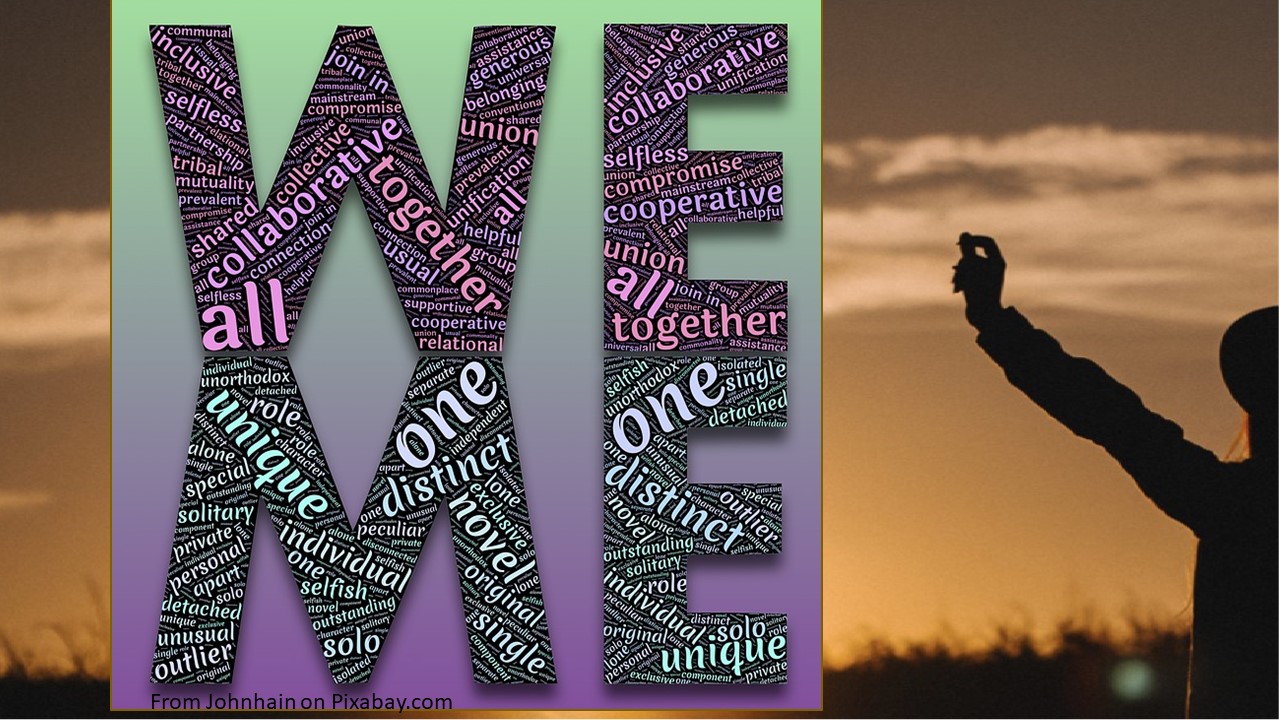 The congregation Luke describes here near the beginning of the book of Acts wasn’t spectacular. It wouldn’t be considered particularly successful according to modern business practices. The fellowship didn’t include the leading folks of Jerusalem. Everyone was poor and marginalized. They didn’t have any glitzy advertising or even a fancy sign out front. After all, they tried to blend in and not stand out because there were those didn’t appreciate their message. But, despite all this, there was something magnetic about this community. They were generous and gracious. They were willing to help each other and to forgive others for the wrongs they’ve done because they’d experienced forgiveness in Jesus Christ. It was this magnetic appeal that drew folks to the church. Why else would someone risk persecutions and isolation by becoming a Christian?
The congregation Luke describes here near the beginning of the book of Acts wasn’t spectacular. It wouldn’t be considered particularly successful according to modern business practices. The fellowship didn’t include the leading folks of Jerusalem. Everyone was poor and marginalized. They didn’t have any glitzy advertising or even a fancy sign out front. After all, they tried to blend in and not stand out because there were those didn’t appreciate their message. But, despite all this, there was something magnetic about this community. They were generous and gracious. They were willing to help each other and to forgive others for the wrongs they’ve done because they’d experienced forgiveness in Jesus Christ. It was this magnetic appeal that drew folks to the church. Why else would someone risk persecutions and isolation by becoming a Christian? I recently read an article on why we need to make a weekly commitment to attend church. I’ll post this article I my next e-news. It was written by a young widow who describes the church as “the sweetest fellowship this side of heaven.” Her husband died suddenly one night after having been taken to the hospital by an ambulance for shortness of breath. She was left with seven kids. Before leaving the hospital, she called a friend from church. By the time she was home, the friend was there to sit with her. Others came in to grieve, to bring meals, to help clean the house, fix broken appliances and cars, and to minister to and pray for her and her children. The church is not always perfect, she notes. At times, the church can be even cruel. But when we live up to our calling to reflect Jesus’ face to the world, we demonstrate what was described in our passage today. The church can be the sweetest fellowship this side of heaven.
I recently read an article on why we need to make a weekly commitment to attend church. I’ll post this article I my next e-news. It was written by a young widow who describes the church as “the sweetest fellowship this side of heaven.” Her husband died suddenly one night after having been taken to the hospital by an ambulance for shortness of breath. She was left with seven kids. Before leaving the hospital, she called a friend from church. By the time she was home, the friend was there to sit with her. Others came in to grieve, to bring meals, to help clean the house, fix broken appliances and cars, and to minister to and pray for her and her children. The church is not always perfect, she notes. At times, the church can be even cruel. But when we live up to our calling to reflect Jesus’ face to the world, we demonstrate what was described in our passage today. The church can be the sweetest fellowship this side of heaven.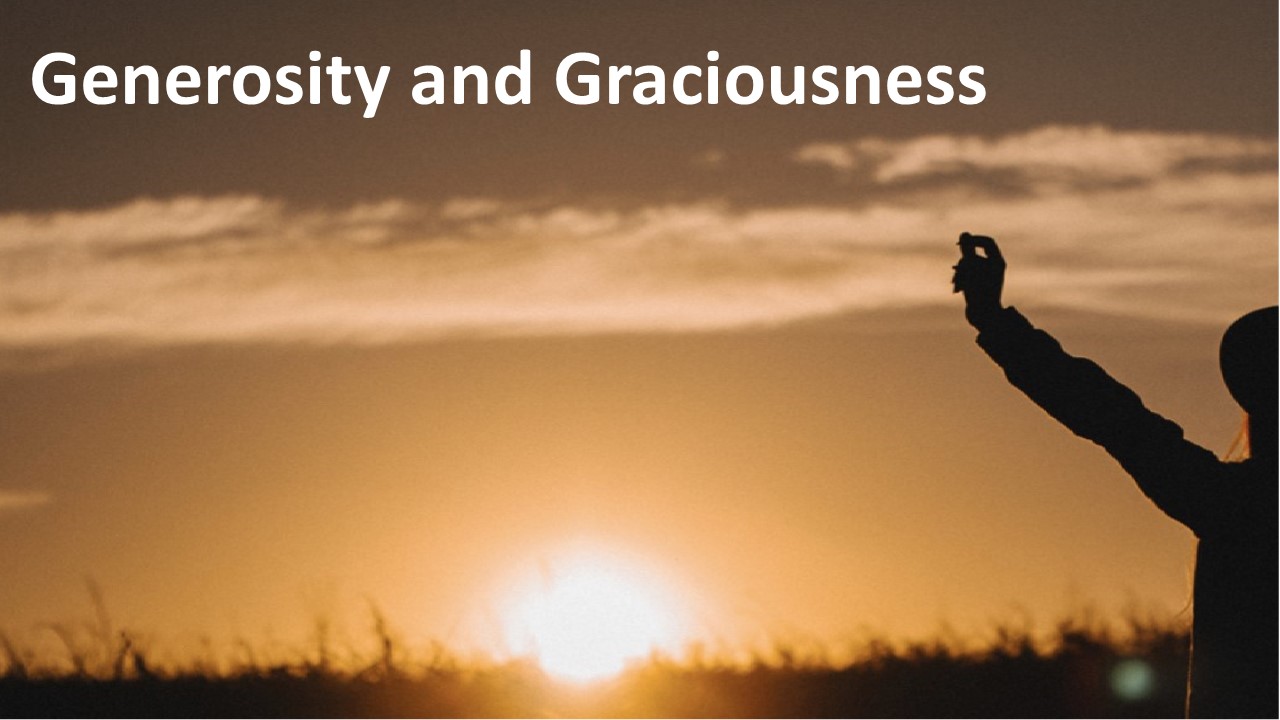 Friends, today we receive our estimate of giving offerings for 2020, which is a sign of one half of that last question—how generous we are. We are encouraged to grow in generosity. As Vic Bell suggested last week, we’re to take a step toward being more generous, as we strive to become the church described in Acts. I pray that you will be generous and continue to take steps in this direction. But just as important as generosity is, don’t forget to be graciousness. On your walk with Christ, show grace to one another, just as God has been gracious with us. Realize what God has done and commit yourselves to do what? Say it after me… To be more being generous and gracious. Amen.
Friends, today we receive our estimate of giving offerings for 2020, which is a sign of one half of that last question—how generous we are. We are encouraged to grow in generosity. As Vic Bell suggested last week, we’re to take a step toward being more generous, as we strive to become the church described in Acts. I pray that you will be generous and continue to take steps in this direction. But just as important as generosity is, don’t forget to be graciousness. On your walk with Christ, show grace to one another, just as God has been gracious with us. Realize what God has done and commit yourselves to do what? Say it after me… To be more being generous and gracious. Amen. Bonnie Jo Campbell, Once Upon a River (New York: W.W. Norton, 2011), 348 pages.
Bonnie Jo Campbell, Once Upon a River (New York: W.W. Norton, 2011), 348 pages.


 George Bailey had no idea he’d touched so many lives. Sometimes the “little things” we do are hard to see and don’t reach fruition until years later. But if we have our priorities right, we can plant such seeds that have the potential to make a difference in the world. That’s the implication from our passage from the Letter to Timothy. Let’s take this text apart and consider what we’re being told.
George Bailey had no idea he’d touched so many lives. Sometimes the “little things” we do are hard to see and don’t reach fruition until years later. But if we have our priorities right, we can plant such seeds that have the potential to make a difference in the world. That’s the implication from our passage from the Letter to Timothy. Let’s take this text apart and consider what we’re being told. He suggests that the present won’t last forever. In God’s economy, gold and silver have little value. As Jesus says, we need to remember to store our treasures in heaven.
He suggests that the present won’t last forever. In God’s economy, gold and silver have little value. As Jesus says, we need to remember to store our treasures in heaven. Paul, like Jesus, doesn’t condemn riches in and of themselves. Instead, he points out the dangers or the temptations that come with wealth. Those who are rich must be on guard for two temptations. John Calvin called them “pride and deceitful hope.”
Paul, like Jesus, doesn’t condemn riches in and of themselves. Instead, he points out the dangers or the temptations that come with wealth. Those who are rich must be on guard for two temptations. John Calvin called them “pride and deceitful hope.” Let’s explore these two items deeper: Riches can tempt us to act haughty. In other words, we are tempted to have a big ego, or to think more of ourselves than we should. The extreme example of this type of behavior in the movie “It’s a Wonderful Life” is Mr. Potter. He’s a Scrooge-like character that doesn’t experience the joyous conversion of Dicken’s Scrooge. Riches can be a barrier from the humility that’s needed in order to properly see ourselves in God’s kingdom. Augustine, in a sermon during the 4th Century, reflected on this passage saying riches isn’t the problem, it’s the disease which some get from riches which is pride.
Let’s explore these two items deeper: Riches can tempt us to act haughty. In other words, we are tempted to have a big ego, or to think more of ourselves than we should. The extreme example of this type of behavior in the movie “It’s a Wonderful Life” is Mr. Potter. He’s a Scrooge-like character that doesn’t experience the joyous conversion of Dicken’s Scrooge. Riches can be a barrier from the humility that’s needed in order to properly see ourselves in God’s kingdom. Augustine, in a sermon during the 4th Century, reflected on this passage saying riches isn’t the problem, it’s the disease which some get from riches which is pride. In this week’s e-news that I sent out, I linked to an article about a small Lutheran Church in Minnesota. They were down to 20 members and had enough money to carry them for 18 months when a new pastor arrived. He told them his first Sunday, “You’re dead.” Then he asked, “Now what you are going to do?” The members of the church decided if they were to die, they’d do it well, so they began to seek ways to love and care for those around them. They made no demands on those they helped. They offered to do whatever they could to help people in their neighborhood. At first, they only had a few offers. But they kept on and as they continued, they picked up volunteers. Many of these people were not religious, but they liked the idea of church being supportive of the community.
In this week’s e-news that I sent out, I linked to an article about a small Lutheran Church in Minnesota. They were down to 20 members and had enough money to carry them for 18 months when a new pastor arrived. He told them his first Sunday, “You’re dead.” Then he asked, “Now what you are going to do?” The members of the church decided if they were to die, they’d do it well, so they began to seek ways to love and care for those around them. They made no demands on those they helped. They offered to do whatever they could to help people in their neighborhood. At first, they only had a few offers. But they kept on and as they continued, they picked up volunteers. Many of these people were not religious, but they liked the idea of church being supportive of the community. When we look beyond ourselves, we realize there are three things we can do with money.
When we look beyond ourselves, we realize there are three things we can do with money. When we look out from ourselves, we should consider how we might make a difference with our money. Whether we can give large amounts or only a small amount, we need to see our giving as an investment in God’s kingdom. But we don’t do it only if we know we can make a difference, we do it because we know that our efforts will be joined with the giving of others and then that will be blessed by God’s Spirit. Giving is an act of faith. It’s like the message we heard from Dean Smith a few weeks ago, about how that annoying jingle of change in our pockets can be saved and when we add them with change from other pockets, we soon have enough to make a difference in the lives of the hungry. When the community comes together like this, we can make a difference in the world.
When we look out from ourselves, we should consider how we might make a difference with our money. Whether we can give large amounts or only a small amount, we need to see our giving as an investment in God’s kingdom. But we don’t do it only if we know we can make a difference, we do it because we know that our efforts will be joined with the giving of others and then that will be blessed by God’s Spirit. Giving is an act of faith. It’s like the message we heard from Dean Smith a few weeks ago, about how that annoying jingle of change in our pockets can be saved and when we add them with change from other pockets, we soon have enough to make a difference in the lives of the hungry. When the community comes together like this, we can make a difference in the world. Next week is Consecration Sunday. We are asking for you to make an estimate of giving for 2020, to help the church do its budgeting. As you prepare yourself to make this estimate, I ask you to pray throughout the week for God to give you a vision. You can add this prayer to the prayer that you we’ve been asking you to make on behalf of the church. Ask God how you can make a difference in the world? Let us pray:
Next week is Consecration Sunday. We are asking for you to make an estimate of giving for 2020, to help the church do its budgeting. As you prepare yourself to make this estimate, I ask you to pray throughout the week for God to give you a vision. You can add this prayer to the prayer that you we’ve been asking you to make on behalf of the church. Ask God how you can make a difference in the world? Let us pray: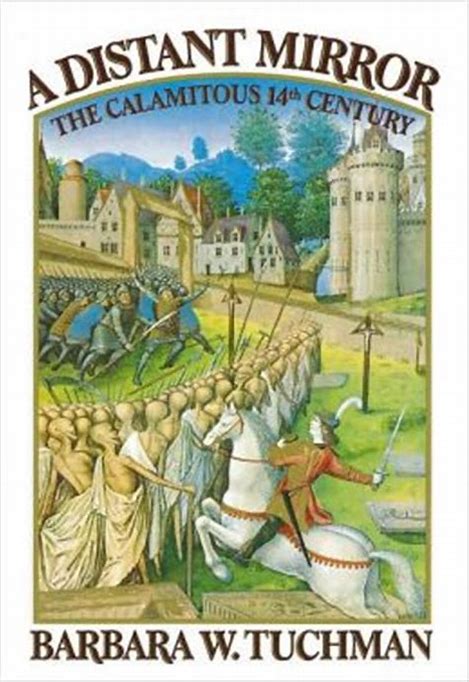 Barbara Tuchman, A Distant Mirror: The Calamitous 14th Century (New York: Knopf, 1978), 720 pages including notes and index. Some plates of photos and artwork.
Barbara Tuchman, A Distant Mirror: The Calamitous 14th Century (New York: Knopf, 1978), 720 pages including notes and index. Some plates of photos and artwork.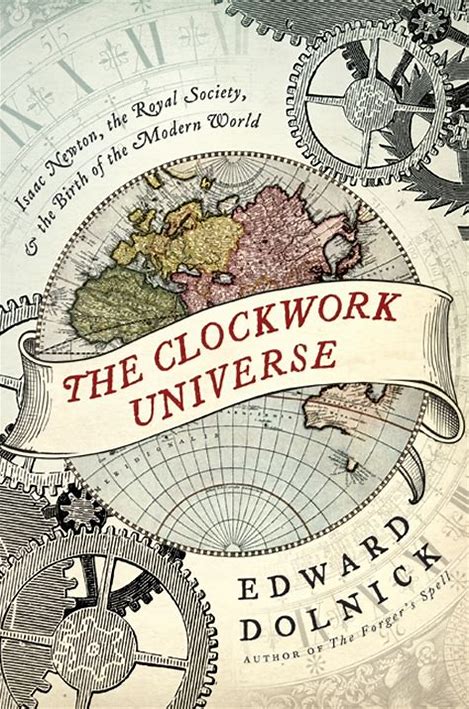 Edward Dolnick, A Clockwork Universe: Isaac Newton, the Royal Society and the Birth of the Modern World, 2012 (Audible 10 hours and 4 minutes).
Edward Dolnick, A Clockwork Universe: Isaac Newton, the Royal Society and the Birth of the Modern World, 2012 (Audible 10 hours and 4 minutes).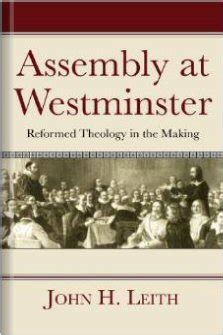 John H. Leith, Assembly at Westminster: Reformed Theology in the Making (Atlanta: John Knox Press, 1973), 127 pages.
John H. Leith, Assembly at Westminster: Reformed Theology in the Making (Atlanta: John Knox Press, 1973), 127 pages.




 This passage is about us looking deeply and getting our priorities right. There are three connected proverbial thoughts here, which Jesus uses to encourage his listeners to evaluate their lives and to see where they are placing their trust. First, we’re not to trust worldly treasures for they have a way of disappearing. A fine wardrobe can be destroyed by moths, objects crafted out of metal can rust, and what’s to stop someone from stealing them when we’re not looking. Notice, however, Jesus doesn’t say that having nice things is bad. He just says we can’t trust them to always be there and that the problem with such niceties is that when we place too much trust in them, we risk not trusting God. Ultimately, our treasurers are going to fail us.
This passage is about us looking deeply and getting our priorities right. There are three connected proverbial thoughts here, which Jesus uses to encourage his listeners to evaluate their lives and to see where they are placing their trust. First, we’re not to trust worldly treasures for they have a way of disappearing. A fine wardrobe can be destroyed by moths, objects crafted out of metal can rust, and what’s to stop someone from stealing them when we’re not looking. Notice, however, Jesus doesn’t say that having nice things is bad. He just says we can’t trust them to always be there and that the problem with such niceties is that when we place too much trust in them, we risk not trusting God. Ultimately, our treasurers are going to fail us. The second proverbial through is about a “healthy eye.” My father just had cataract surgery this week and was telling me on Friday about how bright the colors are now that his eye is healthier. But Jesus isn’t making a pitch for eye surgery. Jesus listeners would have known right away what he was talking about when he mentioned an unhealthy or evil eye. They understood that an evil eye referred to an envious, grudging or miserly spirit, while a good eye connotes a generous and compassionate attitude toward life. One of my professors from seminary, in his commentary on Matthew, says it’s as if Jesus’ says: “Just as a blind person’s life is darkened because of an eye malfunction, so the miser’s life is darkened by his failure to deal generously with others.”
The second proverbial through is about a “healthy eye.” My father just had cataract surgery this week and was telling me on Friday about how bright the colors are now that his eye is healthier. But Jesus isn’t making a pitch for eye surgery. Jesus listeners would have known right away what he was talking about when he mentioned an unhealthy or evil eye. They understood that an evil eye referred to an envious, grudging or miserly spirit, while a good eye connotes a generous and compassionate attitude toward life. One of my professors from seminary, in his commentary on Matthew, says it’s as if Jesus’ says: “Just as a blind person’s life is darkened because of an eye malfunction, so the miser’s life is darkened by his failure to deal generously with others.” The next statement by Jesus concerns serving two masters. A slave would be run ragged if he had to answer to two masters. Likewise, if we try to serve both God and money, we find ourselves with two masters and the latter, money, makes a harsh master. There can never be enough. We need to place our priorities in order. We need to stick with God.
The next statement by Jesus concerns serving two masters. A slave would be run ragged if he had to answer to two masters. Likewise, if we try to serve both God and money, we find ourselves with two masters and the latter, money, makes a harsh master. There can never be enough. We need to place our priorities in order. We need to stick with God. It sounds too simple. “Store up your treasures in heaven; don’t worry about things here on earth.” Easier said than done, right? We all worry about having enough for tomorrow—and the day and the year and the decade that follows. We must admit that our prayers for daily bread seem unnecessary when we have a pantry full of food. When we have too much, it’s hard to depend upon God.
It sounds too simple. “Store up your treasures in heaven; don’t worry about things here on earth.” Easier said than done, right? We all worry about having enough for tomorrow—and the day and the year and the decade that follows. We must admit that our prayers for daily bread seem unnecessary when we have a pantry full of food. When we have too much, it’s hard to depend upon God. How might we learn not to store up our treasures here on earth? First, “Enjoy things, but don’t cherish them.” God created this world good and wants us to enjoy life and the blessings provided, but God gets angry when we see such blessings as being ours or being worthy of our worship. Second, “Share things joyfully, not reluctantly.” If it bugs you to share something you have with someone who needs it, you should then know that item has gotten a hold on you. It’s an earthly treasure, an idol. Finally, “Think as a pilgrim, not a settler.” “The world is not my home, I’m just passin’ thru,” the old gospel song goes.
How might we learn not to store up our treasures here on earth? First, “Enjoy things, but don’t cherish them.” God created this world good and wants us to enjoy life and the blessings provided, but God gets angry when we see such blessings as being ours or being worthy of our worship. Second, “Share things joyfully, not reluctantly.” If it bugs you to share something you have with someone who needs it, you should then know that item has gotten a hold on you. It’s an earthly treasure, an idol. Finally, “Think as a pilgrim, not a settler.” “The world is not my home, I’m just passin’ thru,” the old gospel song goes. Look inside yourself and use these thoughts to evaluate what you have: Enjoy, Share, and think like a pilgrim. A pilgrim is like a backpacker. Remember, you don’t want your pack to weigh you down. Amen.
Look inside yourself and use these thoughts to evaluate what you have: Enjoy, Share, and think like a pilgrim. A pilgrim is like a backpacker. Remember, you don’t want your pack to weigh you down. Amen.